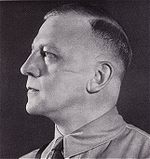
Adolf Wagner
Encyclopedia

- This article concerns the Nazi official Adolf Wagner; for the German economist, see Adolph WagnerAdolph WagnerAdolph Wagner was a German economist and politician, a leading Kathedersozialist and public finance scholar and advocate of Agrarianism...
.
Adolf Wagner (October 1, 1890 in Algringen, Lothringen - April 12, 1944 in Bad Reichenhall) was a German
Germany
Germany , officially the Federal Republic of Germany , is a federal parliamentary republic in Europe. The country consists of 16 states while the capital and largest city is Berlin. Germany covers an area of 357,021 km2 and has a largely temperate seasonal climate...
soldier and high-ranking Nazi Party official born in Algrange
Algrange
Algrange is a commune in the Moselle department in Lorraine in north-eastern France....
, Alsace-Lorraine
Alsace-Lorraine
The Imperial Territory of Alsace-Lorraine was a territory created by the German Empire in 1871 after it annexed most of Alsace and the Moselle region of Lorraine following its victory in the Franco-Prussian War. The Alsatian part lay in the Rhine Valley on the west bank of the Rhine River and east...
.
He served in World War I
World War I
World War I , which was predominantly called the World War or the Great War from its occurrence until 1939, and the First World War or World War I thereafter, was a major war centred in Europe that began on 28 July 1914 and lasted until 11 November 1918...
as an officer in the German Army. A member of the Nazi Party from its earliest days, he was appointed a Gauleiter
Gauleiter
A Gauleiter was the party leader of a regional branch of the NSDAP or the head of a Gau or of a Reichsgau.-Creation and Early Usage:...
for various districts in Germany
Germany
Germany , officially the Federal Republic of Germany , is a federal parliamentary republic in Europe. The country consists of 16 states while the capital and largest city is Berlin. Germany covers an area of 357,021 km2 and has a largely temperate seasonal climate...
, eventually becoming Gauleiter of the Gau München-Oberbayern
Gau München-Oberbayern
The Gau München-Oberbayern was an administrative division of Nazi Germany in Upper Bavaria, Bavaria from 1933 to 1945...
. He was also Minister of the Interior and of cultural affairs of Bavaria and there the absolute ruler exceeding the formal head of state, the Reichsstatthalter and the Prime Minister Ludwig Siebert
Ludwig Siebert (politician)
Ludwig Siebert was a Nazi politician and Bavarian prime minister from 1933 to 1942.-Life:...
by far in power. He served as the master of ceremonies for the annual commemorations of the Beer Hall Putsch
Beer Hall Putsch
The Beer Hall Putsch was a failed attempt at revolution that occurred between the evening of 8 November and the early afternoon of 9 November 1923, when Nazi Party leader Adolf Hitler, Generalquartiermeister Erich Ludendorff, and other heads of the Kampfbund unsuccessfully tried to seize power...
every November 9 in Munich.
Wagner angered Adolf Hitler
Adolf Hitler
Adolf Hitler was an Austrian-born German politician and the leader of the National Socialist German Workers Party , commonly referred to as the Nazi Party). He was Chancellor of Germany from 1933 to 1945, and head of state from 1934 to 1945...
in 1941 when he insisted on removing crucifixes from Bavarian classrooms, which outraged the Roman Catholic Church and the general public. The opposition to this move was so strong Wagner was forced to rescind the order, one of the rare circumstances of successful public opposition in Nazi Germany
Nazi Germany
Nazi Germany , also known as the Third Reich , but officially called German Reich from 1933 to 1943 and Greater German Reich from 26 June 1943 onward, is the name commonly used to refer to the state of Germany from 1933 to 1945, when it was a totalitarian dictatorship ruled by...
.
Despite this faux pas, Hitler apparently remained on good terms with Wagner. When Wagner died in April 1944, two years after suffering a stroke that had effectively incapacitated him, the increasingly reclusive Führer
Führer
Führer , alternatively spelled Fuehrer in both English and German when the umlaut is not available, is a German title meaning leader or guide now most associated with Adolf Hitler, who modelled it on Benito Mussolini's title il Duce, as well as with Georg von Schönerer, whose followers also...
made a rare public appearance to attend his lavish funeral, and posthumously awarded him the German Order
German Order
German Order refers to:*German Order , the highest decoration that the Nazi Party could bestow on an individual*Another name for the Teutonic Knights...
, the Nazi Party's highest decoration.

